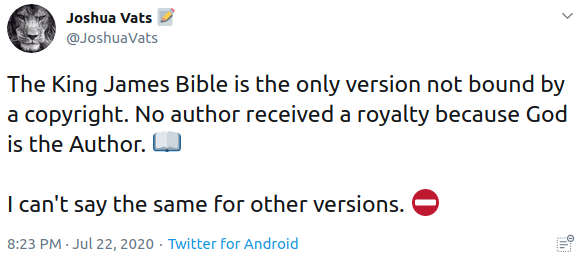|
by pragerfan August 3, 2020 I dialogue with a lot of religious people on Twitter. Many of my followers and those whom I follow are "born-again" or Fundamentalist Christians. They are great Christians. They are extraordinarily devoted to the KJV Bible and to Jesus. They even put Scripture verses in their taglines. Some are more knowledgeable regarding the Bible than others. By way of background I have always had a keen intellectual interest in God and the Bible, and in 2016 completed a master's degree in theology. I myself was an Evangelical for about 20 years, but although the KJV is by far my favorite version of the Bible, I never was a Fundamentalist. I am not a Roman Catholic, so I don't have a "dog in the race" so to speak regarding the arguments between Protestants and Catholics. None of the following is to suggest anyone is wrong about their faith, or doesn't have enough faith. None of it is to suggest that God will look negatively on those with whom I disagree. I don't claim — and I would never claim — to have all the answers. The issue is not faith judgment but rather dismissal of history. I make no judgments concerning another's faith or standing before God — when Jesus said, "Do not judge," this is precisely what he was talking about. But this does not preclude us from calling out errors in fact and history. Fundamentalism is often characterized by a slavish devotion to the KJV. To paraphrase, the King James Bible fell down from heaven with the words of Christ in red. All other Bibles either have errors or are outright frauds. So let's start with this tweet from @JoshuaVats. The only reason I am using the account names in this article is that I want to show you that these are real tweets from real people. They are not made up. In this tweet Joshua makes some anachronistic errors. For example copyrights really didn't come into their own until the 1700s, so a copyright in 1611 would have been highly unusual, especially given that the KJV version was commissioned by Royal decree, "by His Majesty's Special Command, Appointed to be Read in Churches." For such a Bible, a copyright is obviously superfluous. And by Ockam's razor, if the KJV doesn't have a copyright because either copyrights didn't exist or it was commisioned by the king's decree, it isn't necessary to call in arguments such as "God is the Author." Explanations should not be needlessly multiplied. But what about authorship by God? II Timothy 3:16 states that the "Scripture" is "inspired" by God. The word for inspired is the Greek word for "breath" or "breathed," so we can fairly say that while God may not personally have taken pen to paper, the Scripture is breathed, or inspired, by God, but it is also a work of its authors. What is the "Scripture" that Paul references in this passage? Fundamentalists often suppose II Timothy 3:16 applies to the New Testament. It does not. This is an anachronistic error because the New Testament didn't exist when St. Paul wrote his second letter to Timothy. In fact, the Gospels themselves hadn't been written yet. There was no New Testament. The Church was in its infancy. There were still eyewitnesses alive who had personally seen the Lord both before and after his resurrection. "Scripture" for St. Paul was the Old Testament. In my opinion, there is an underlying reason why Fundamentalists make this "mistake" — it's not a mistake at all. For if Fundamentalists admit that II Timothy 3:16 does not cover the New Testament, they will be forced to confront the question of what gives the New Testament its religious and spiritual authority? The answer is the Early Christian Church itself — specifically the Church of the first thousand years. In 367 AD we have the first mention of the 27 books of the New Testament. St. Athanasius, Bishop of Alexandria, Egypt, published a festal (Easter) letter in which he lists these books. He writes Since some have taken in hand to set in order for themselves the so-called apocrypha and to mingle them with the God-inspired scripture, concerning which we have attained to a sure persuasion, according to what the original eye-witness and ministers of the word have delivered unto our fathers, I also, having been urged by true brethren and having investigated the matter from the beginning, have decided to set forth in order the writings that have been put in the canon, that have been handed down and confirmed as divine, in order that every one who has been led astray may condemn his seducers, and that every one who has remained stainless may rejoice, being again reminded of that...Note that by "apocryphal writings" St. Athanasius is referring to books such as The Gospel of Peter, the Gospel of Thomas, the Acts of Andrew, and so on. A complete list can be found here, but what's important is that the Saint is not referring to the Old Testament deutero-canon. Of the deutero-canon he writes But for the sake of greater accuracy I add, being constrained to write, that there are also other books besides these, which have not indeed been put in the canon, but have been appointed by the Fathers as reading-matter for those who have just come forward and which to be instructed in the doctrine of piety: the Wisdom of Solomon, the Wisdom of Sirach, Esther, Judith, Tobias, the so-called Teaching [Didache] of the Apostles, and the Shepherd. And although, beloved, the former are in the canon and the latter serve as reading matter, yet mention is nowhere made of the apocrypha; rather they are a fabrication of the heretics, who write them down when it pleases them and generously assign to them an early date of composition in order that they may be able to draw upon them as supposedly ancient writings and have in them occasion to deceive the guileless.Many of the OT deutero-canon were eventually accepted into the canon, and incidentally, were not removed from the KJV until its third revision in 1769 — the 1769 KJV is the the Bible we know as the KJV today. Some of these NT books, such as the Shepherd of Hermas, didn't make it into the New Testament Canon. This doesn't mean they are bad, it just means that the Early Fathers who decided which books were in and which were out did not believe that these presented perfect theology. Even Revelation wasn't finally accepted by the Church until the 900s. Fundamentalists reject the Early Christian Church with its traditions of liturgies, icons, incense, priests, bishops, robes, prayers the saints for intercession, and doctrine of the real presence (instead, Communion is just grape juice and crackers "done in remembrance"). But the Bishops of this Early Christian Church gave us the New Testament. It follows that if the Fundamentalist rejects the Early Christian Church, why does he accept its New Testament? Let's look at another tweet, this one is from user @JimStephens12. Now, obviously Twitter has limitations. No one claims it is possible to do enlightened theology in 280 characters or less. But this tweet is fallacious, for at least two reasons. First, the Old Testament was originally written in Hebrew and Aramaic. The Greek Septuagint (or LXX) translation was made for Diaspora Jews, for whom Hebrew was not the only or even the primary language. Parts of the LXX translation suggest that they were made from a Hebrew or Aramaic text different from what we have today. The New Testament was written in Greek. Some claim the New Testament was written in Aramaic first, or alongside the Greek texts, and that Aramaic version, the Peshitta, is supposedly authoritative, but most modern Biblical scholarship rejects this view. The New Testament, written in Koine Greek, was later translated into Latin (the Latin Vulgate), then the Latin was translated into English for Roman Catholic Bibles. The point here is that all Bibles we have today, except the New Testament Koine Greek texts, are translations, and no translation is perfect, even the King James Version. Unless you're reading the New Testament in Koine Greek — and I have a friend who does — you're reading a translation, and translations are by their nature imperfect, in part because it is impossible to convey every nuance of thought from one language to another.1 Second, even if a translation is imperfect, it does not logically follow that it "points you to the Anti-christ & not unto Jesus." Mainstream versions of the Bible recount the same historical events. A woman named Mary conceived and gave birth to a baby called Jesus. When Jesus was 30 years of age he became an itinerant preacher. Roughly three years later, he was crucified by the Roman authorities at the behest of some Jews — not all — in the Sandhedrin. Roman guards were placed at his tomb and a large stone which took several strong men to move was rolled in front of the entrance. On the third day after his crucifixion some women went to the tomb and found that the stone was rolled to the side and the tomb was empty. Those are the historical events that New Testament relates to us. For a more detailed analysis of those events, see here. If mainstream versions of the New Testament recount the same historical events, why does the KJV alone point us to Jesus while all the rest point us in the opposite direction? Were all previous versions, such as the Vulgate, Wycliffe, Tyndale, Dhouay-Rheims, Geneva Bible, and so on invalid? What about all the versions that have been produced since the King James Version? Are the NASB, NAB, RSV, NIV, ESV, etc. the figurative "work of the Devil?" Once again, the argument that only the King James Version leads to salvation is far from logically compelling. There is much more to say about priests, bishops, sacraments, and so on. Perhaps I will update this article to get to these topics. But the problem in my view with Fundamentalism is its cavalier dismissal of the early Christian Church and Christian history prior to 1611, and especially prior to the Great Schism. It's as if Christian history started with King James in 1611. But in truth, while the King James Bible was a monumental accomplishment, Christian history reaches back over a millenium and a half prior to King James. Those who ignore this can't have a complete understanding of Christianity, in my view. This of course is not to take anything away from their faith, or from the King James Bible, which is easily the greatest document ever written by the hand of man. This article will be updated ad hoc as time permits. 1 The KJV Old Testament does contain errors. For example, Psalm 145 (144 LXX) is a poem, the Hebrew text of which is acrostic. Verse 13 begins with the letter Mem, which means that verse 14 should begin with Nun, the next letter in the alphabet. Instead, it begins with Samekh, indicating that a line has fallen out of the Hebrew text. This is not a problem for scholars due to the fact that the LXX contains the missing line. However, the scroll of Psalms found at Qumran contains the Hebrew text of this line as well. Consequently, the KJV translators employed a defective manuscript and therefore produced a defective translation. —JW This does NOT mean the translation is bad; rather it lacks perfection. The KJV in fact underwent three revisions of its English text. The 1769 revision, which is the King James Bible most people know today, is the last of these. |



